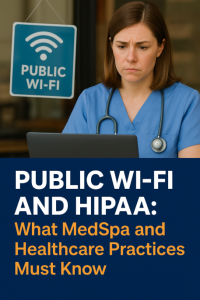
In today’s fast-paced world, it’s not uncommon for practice managers, medspa owners, or even front office staff to access email, patient notes, or vendor portals while on the go. But if you’re using public Wi-Fi at a coffee shop, hotel, or airport, you might be doing more harm than good—especially when it comes to HIPAA compliance and patient data security.
Let’s break down why public Wi-Fi is a major risk, and what your healthcare business can do to stay protected.
🚨 The Problem: Public Wi-Fi Is Not Private
That “Free Guest Wi-Fi” might look harmless, but these networks are often unsecured or spoofed by hackers pretending to be legitimate access points.
Here’s what can happen when you connect to public Wi-Fi without precautions:
-
Eavesdropping: Cybercriminals can intercept sensitive information being transmitted, including login credentials and patient communications.
-
Man-in-the-Middle Attacks: Hackers insert themselves between your device and the web, quietly collecting everything you send and receive.
-
Rogue Networks: Malicious actors set up fake Wi-Fi networks named “Starbucks_Guest” or “Hilton_WiFi” and wait for unsuspecting users to connect.
For healthcare providers and medspas, even one leaked patient record due to negligence could lead to HIPAA violations, fines, and loss of trust.
🔐 The HIPAA Angle: It’s Not Just IT’s Problem
HIPAA requires that Protected Health Information (PHI) is secured at all times—whether at the office or on the go. That includes:
-
Secure access to patient charts and systems
-
Device-level protection (laptops, tablets, smartphones)
-
Staff training and awareness
Using public Wi-Fi without encryption or VPN protection violates these standards and puts your practice at risk—even if you’re just checking email.
✅ Safer Ways to Work on the Go
Here are Scorpion Technology’s top security recommendations for mobile healthcare and medspa professionals:
-
Use a VPN – A virtual private network encrypts your internet connection, even on public Wi-Fi.
-
Turn Off Auto-Connect – This stops your device from jumping onto unknown networks without your knowledge.
-
Use a Mobile Hotspot – Tethering to your phone is safer than using random Wi-Fi.
-
Enable 2FA – Require two-factor authentication for all apps and systems tied to PHI.
-
Encrypt Devices – Laptops and mobile devices should be encrypted and protected with strong passwords.
🛡️ Scorpion’s Tip of the Week:
Set up Microsoft 365 security alerts to notify your team of any login attempts from suspicious locations. It’s one of the simplest ways to catch threats before they cause damage.
🧭 Final Word
Public Wi-Fi may seem like a convenient solution while you're traveling or working remotely—but for healthcare practices and medspas, it’s a doorway to potential data breaches and HIPAA headaches.
Don’t take the risk.
Let our team help you assess your mobile security posture and build a HIPAA-compliant, secure remote work strategy.
📞 Ready for peace of mind?
[Contact us today] to schedule a quick IT security check-in for your practice.


